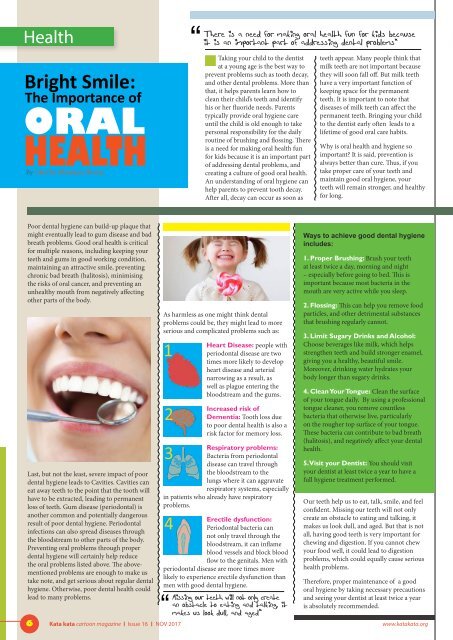Create successful ePaper yourself
Turn your PDF publications into a flip-book with our unique Google optimized e-Paper software.
Health<br />
By Okocha Obianuju Ifeoma<br />
Taking your child to the dentist<br />
at a young age is the best way to<br />
prevent problems such as tooth decay,<br />
and other dental problems. More than<br />
that, it helps parents learn how to<br />
clean their child’s teeth and identify<br />
his or her fluoride needs. Parents<br />
typically provide oral hygiene care<br />
until the child is old enough to take<br />
personal responsibility for the daily<br />
routine of brushing and flossing. There<br />
is a need for making oral health fun<br />
for kids because it is an important part<br />
of addressing dental problems, and<br />
creating a culture of good oral health.<br />
An understanding of oral hygiene can<br />
help parents to prevent tooth decay.<br />
After all, decay can occur as soon as<br />
teeth appear. Many people think that<br />
milk teeth are not important because<br />
they will soon fall off. But milk teeth<br />
have a very important function of<br />
keeping space for the permanent<br />
teeth. It is important to note that<br />
diseases of milk teeth can affect the<br />
permanent teeth. Bringing your child<br />
to the dentist early often leads to a<br />
lifetime of good oral care habits.<br />
Why is oral health and hygiene so<br />
important? It is said, prevention is<br />
always better than cure. Thus, if you<br />
take proper care of your teeth and<br />
maintain good oral hygiene, your<br />
teeth will remain stronger, and healthy<br />
for long.<br />
Poor dental hygiene can build-up plaque that<br />
might eventually lead to gum disease and bad<br />
breath problems. Good oral health is critical<br />
for multiple reasons, including keeping your<br />
teeth and gums in good working condition,<br />
maintaining an attractive smile, preventing<br />
chronic bad breath (halitosis), minimising<br />
the risks of oral cancer, and preventing an<br />
unhealthy mouth from negatively affecting<br />
other parts of the body.<br />
Last, but not the least, severe impact of poor<br />
dental hygiene leads to Cavities. Cavities can<br />
eat away teeth to the point that the tooth will<br />
have to be extracted, leading to permanent<br />
loss of teeth. Gum disease (periodontal) is<br />
another common and potentially dangerous<br />
result of poor dental hygiene. Periodontal<br />
infections can also spread diseases through<br />
the bloodstream to other parts of the body.<br />
Preventing oral problems through proper<br />
dental hygiene will certainly help reduce<br />
the oral problems listed above. The abovementioned<br />
problems are enough to make us<br />
take note, and get serious about regular dental<br />
hygiene. Otherwise, poor dental health could<br />
lead to many problems.<br />
As harmless as one might think dental<br />
problems could be, they might lead to more<br />
serious and complicated problems such as:<br />
Heart Disease: people with<br />
periodontal disease are two<br />
times more likely to develop<br />
heart disease and arterial<br />
narrowing as a result, as<br />
well as plague entering the<br />
bloodstream and the gums.<br />
Increased risk of<br />
Dementia: Tooth loss due<br />
to poor dental health is also a<br />
risk factor for memory loss.<br />
Respiratory problems:<br />
Bacteria from periodontal<br />
disease can travel through<br />
the bloodstream to the<br />
lungs where it can aggravate<br />
respiratory systems, especially<br />
in patients who already have respiratory<br />
problems.<br />
Erectile dysfunction:<br />
Periodontal bacteria can<br />
not only travel through the<br />
bloodstream, it can inflame<br />
blood vessels and block blood<br />
flow to the genitals. Men with<br />
periodontal disease are more times more<br />
likely to experience erectile dysfunction than<br />
men with good dental hygiene.<br />
Ways to achieve good dental hygiene<br />
includes:<br />
1. Proper Brushing: Brush your teeth<br />
at least twice a day, morning and night<br />
– especially before going to bed. This is<br />
important because most bacteria in the<br />
mouth are very active while you sleep.<br />
2. Flossing: This can help you remove food<br />
particles, and other detrimental substances<br />
that brushing regularly cannot.<br />
3. Limit Sugary Drinks and Alcohol:<br />
Choose beverages like milk, which helps<br />
strengthen teeth and build stronger enamel,<br />
giving you a healthy, beautiful smile.<br />
Moreover, drinking water hydrates your<br />
body longer than sugary drinks.<br />
4. Clean Your Tongue: Clean the surface<br />
of your tongue daily. By using a professional<br />
tongue cleaner, you remove countless<br />
bacteria that otherwise live, particularly<br />
on the rougher top surface of your tongue.<br />
These bacteria can contribute to bad breath<br />
(halitosis), and negatively affect your dental<br />
health.<br />
5. Visit your Dentist: You should visit<br />
your dentist at least twice a year to have a<br />
full hygiene treatment performed.<br />
Our teeth help us to eat, talk, smile, and feel<br />
confident. Missing our teeth will not only<br />
create an obstacle to eating and talking, it<br />
makes us look dull, and aged. But that is not<br />
all, having good teeth is very important for<br />
chewing and digestion. If you cannot chew<br />
your food well, it could lead to digestion<br />
problems, which could equally cause serious<br />
health problems.<br />
Therefore, proper maintenance of a good<br />
oral hygiene by taking necessary precautions<br />
and seeing your dentist at least twice a year<br />
is absolutely recommended.<br />
6 Kata kata cartoon magazine <strong>Issue</strong> <strong>16</strong> NOV <strong>2017</strong> www.katakata.org
















